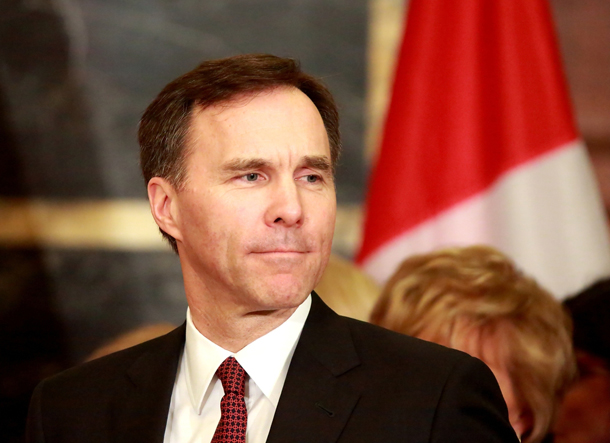Canada will run more than $113-billion worth of federal government deficits over the next five years, according to today's budget.
The Liberal government says that the lagging economy calls for major infrastructure spending and investments that encourage innovation, even if that means higher deficits.
Austerity measures aimed at balancing the budget would damage the economy, the government says.
"Canadians understand that a country can't cut its way to prosperity," reads the introduction of the 270-page budget titled Growing the Middle Class.
The approach drew praise from the country's largest labour group. "I think most workers will be relieved," said Canadian Labour Congress president Hassan Yussuff.
A $29.4-billion deficit is expected for the 2016-17 fiscal year, with an additional $29-billion deficit expected next year. The deficits then begin to decline, with a $14.3-billion deficit predicted for the 2020-21 fiscal year.
Finance Minister Bill Morneau did not say when Canada would return to balanced budgets and surpluses.
Prime Minister Justin Trudeau won last year's election campaign after promising a $10-billion deficit for this year and a return to balanced budgets before the next election.
The government is now forecasting a deficit of $5.4 billion for the current fiscal year. The former Conservative government had predicted a small surplus.
The budget noted that Canadian wages have essentially stagnated since the late 1970s, while the cost of living increased.
The budget is aimed at reversing the trend and growing the middle class, it said.
Measures include extending employment insurance to regions hit hard by the economic slump, a new childcare benefit and tax changes to reduce the share paid by those earning average salaries.
EI changes a good first step, says labour president
Yussuff said the budget could be considered labour friendly. "It's going to hopefully stimulate the economy so we can get people back to work," he said.
He said the EI changes are a step in the right direction -- though they don't go far enough -- and measures to encourage apprenticeships are also welcome.
The government plans to spend $120 billion on infrastructure over the next decade in an effort to boost the economy.
Some of that money will be spent on improving transit systems across the country, with Ontario allocated the most at $1.5 billion and B.C. promised $460 million.
But Yussuff said the budget measures alone are not enough to help Canada's middle class in the long term.
Initiatives such as the former Conservative government's moves to limit the ability of workers to unionize contributed to the shrinking of the middle class, he said.
Yussuff praised the Liberal government's decisions to repeal two such pieces of legislation.
"The middle class needs a raise, and you have to allow them to join unions," he said. "People have to get a share of the wealth being created in this country; it's been too lopsided."
'Stretching' promises: NDP MP
Opposition MPs were less supportive of the budget.
Vancouver-Kingsway NDP MP Don Davies called it a mixed bag, and though it had some good things in it, big ticket items were nowhere to be seen.
He also took a jab at the Liberals for designing many funding schemes to not kick in until near the end of their term.
"The Liberals during the [election] campaign attacked the NDP merciliessly for our 'lack of ambition' and 'backloading' our promises," he said.
"I see countless examples in this budget where the Liberals are stretching their promises over four, five, six seven years and backloading a lot of the money."
If the Liberals are going to run more than $100 billion in deficits, Davies said, they could have added a national child care program.
Clean tech, CBC benefit
The budget also allocates $120 million over the next five years to support clean technology initiatives, as well as tax incentives for industry.
The Canadian Broadcasting Corporation will see a $675-million investment in the coming years.
Morneau explained this year's larger-than-promised deficit by saying that Canadians voted for the spending.
He said the Liberal government will eventually return to surpluses, but did not pinpoint when.
"We believe we can get to a balanced budget over time," Morneau said. "That said, our priority is to make investments for Canadians -- for the people who are asking us to help them in their day-to-day lives." ![]()
Read more: Federal Politics, Labour + Industry















Tyee Commenting Guidelines
Comments that violate guidelines risk being deleted, and violations may result in a temporary or permanent user ban. Maintain the spirit of good conversation to stay in the discussion.
*Please note The Tyee is not a forum for spreading misinformation about COVID-19, denying its existence or minimizing its risk to public health.
Do:
Do not: